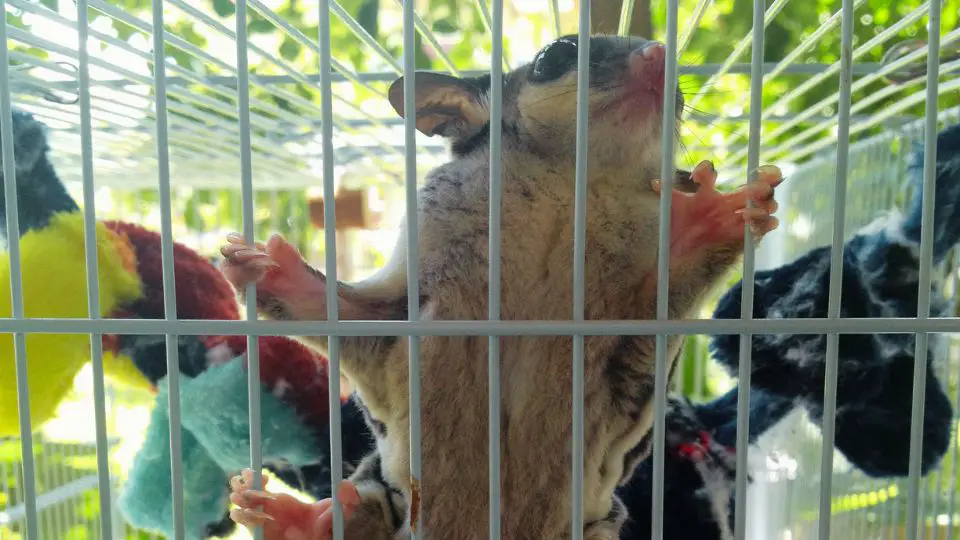Like other animals, sugar gliders can cause allergies in some people. Allergies are caused by an overreaction of the immune system to a protein found in the animal’s skin, saliva or urine.
The most common symptoms of a sugar glider allergy are sneezing, a runny nose, watery eyes, coughing, wheezing or difficulty breathing.
In this article, we talk about why can you be allergic to a sugar glider, what are the symptoms of an allergy and what to do if you are allergic to this little creatures.
Can you be allergic to a sugar glider?
Many people in the United States are allergic to animal dander, which is the skin cells that shedding animals leave behind. In fact, 90% of people from US test positive for animal allergens.
Yes, you can be allergic to a sugar glider. Animal dander can cause allergic reactions in some people, and sugar gliders are no exception. If you have never been around a sugar glider before, it’s best to test your reaction to their dander before committing to owning one.
Allergies happen when your immune system overreacts to a foreign substance, like animal dander. When you come in contact with the allergen, your body produces histamines, which can cause symptoms like sneezing, watery eyes, and a runny nose. In severe cases, an allergy can trigger an asthma attack.
The main reasons you can be allergic to a sugar glider are because of their:
- Dander: is the most common allergen, this is the shedding of dead skin cells and it’s what usually causes people to sneeze and have watery eyes when they’re around animals.
- Fur: is another allergen that can cause reactions in people. It’s the hair that animals shed and it can be just as irritating as dander.
- Urine: can also be an allergen for some people. When sugar gliders mark their territory, they urinate on things and this can cause allergic reactions.
Are sugar gliders hypoallergenic?
No, sugar gliders are not hypoallergenic. They produce dander, fur, and urine, all of which can cause allergic reactions in people.
Signs that you are allergic to a sugar glider
If you are allergic to a sugar glider, you may experience some or all of the following symptoms:
Sneezing
The most common sign of an allergy is sneezing. If you start sneezing when you’re around a sugar glider, it’s likely that you’re allergic to them.
Coughing
Another common symptom of an allergy is coughing. If you find that you’re coughing more when you’re around a sugar glider, or when you are cleaning their cage, it’s likely that you’re allergic to them.
Watery and itchy eyes
Another common symptom of an allergy is watery and itchy eyes. This happens when the histamines produced by your body cause the blood vessels in your eyes to swell.
Runny nose
A runny nose is another symptom of an allergy. This happens when the histamines produced by your body cause the mucus membranes in your nose to swell.
Wheezing
Wheezing is a sign of an allergy that can be especially dangerous. This happens when your body cause the airways in your lungs to constrict. Wheezing can lead to an asthma attack, which can be life-threatening.
Difficulty breathing
Wheezing can cause difficulties in breathing, which is another dangerous symptom of an allergy.
Tightness in the chest
If you start to feel tightness in your chest when you’re around a sugar glider, it’s a sign that you’re having an allergic reaction. This can be a dangerous symptom, especially if you have asthma.
Hives
Hives are another symptom of an allergy. They are raised, red, itchy welts that can appear on your skin.
How to know if you are allergic to a sugar glider
There’s no surefire way to know if you’re allergic to sugar glider without coming into contact with it, but there are some things you can do to lessen your chances of having a reaction.
If you have other pets, see if you are allergic to animal dander in the first place. You can do this by visiting an allergist and getting a skin prick test. If you are allergic to other animals, chances are you’ll be allergic to sugar gliders as well.
If you don’t have any other pets, consider spending time with a friend who has a sugar glider before making the commitment to get one yourself. And finally, make sure you’re aware of the signs of an allergic reaction so you can seek medical help if necessary.
You can also go to a sugar glider breeder and ask if you can hold or interact with the animals before making a purchase.
What to do if I am allergic to a sugar glider?
If you’re allergic to a sugar glider, the best thing you can do is to avoid them. This means not owning one and not spending time around them.
We know that they are beautiful creatures, and it can be hard to resist their cuteness, but it’s important to remember that an allergy is a serious medical condition. Allergies can be dangerous, so it’s important to be aware of the signs and get medical help if necessary.
If you have to be around them, make sure you’re taking allergy medication and carrying an EpiPen in case of a severe reaction. You should also avoid cleaning their cage or coming into direct contact with their saliva or urine.
Conclusion
If you’re allergic to other animals, there’s a good chance you’ll be allergic to sugar gliders as well. The best way to know for sure is to visit an allergist and get a skin prick test. If you’re not allergic to other animals, you can try spending time with a friend who has a sugar glider before making the commitment to get one yourself.
And finally, make sure you’re aware of the signs of an allergic reaction, so you can seek medical help if necessary.







